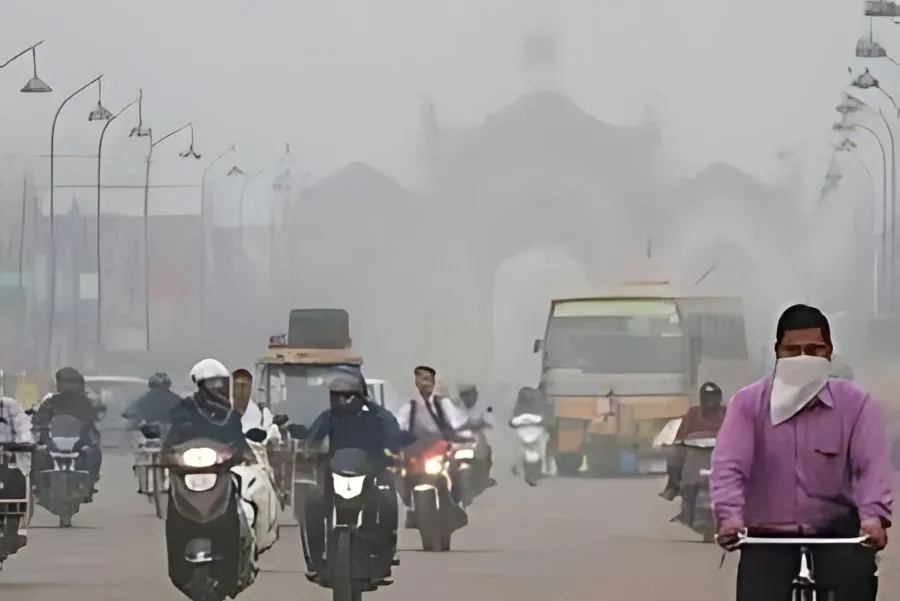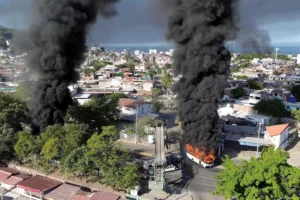Delhi’s Air Quality Worsens, Pollution Leads to Health Crisis
thenewsbuzz November 6, 2024 3
Delhi’s air quality has reached alarming levels, with the Air Quality Index (AQI) surpassing 400 in several areas. On November 5, nearly a third of Delhi’s 39 monitoring stations recorded severe AQI scores, signaling an urgent crisis. This pollution, driven by vehicle emissions, industrial pollutants, and crop-burning smoke from nearby states like Punjab and Haryana, has overwhelmed the capital. As the toxic haze envelops the city, residents face serious health risks.
Government Pushes for Artificial Rain to Combat Pollution
To address this worsening crisis, the Delhi government is urgently seeking approval for artificial rain. Environment Minister Gopal Rai has called on the federal government to approve cloud-seeding, a method that triggers rainfall by dispersing salts into clouds. Last year, this plan failed due to unfavorable weather, but Rai insists that the current pollution levels make it critical to act now. The government hopes this technique will help reduce the toxic air and bring relief to the city.
Hospitals Report Surge in Respiratory Illnesses
As pollution levels rise, hospitals across Delhi have seen a significant spike in patients suffering from respiratory issues. Since the Diwali festival, when firecracker use worsened air quality, healthcare facilities like Fortis and C K Birla have seen a 20%-30% increase in admissions for asthma, chronic obstructive pulmonary disease (COPD), and bronchitis. Doctors warn that prolonged exposure to such toxic air could lead to long-term health problems, especially for children and the elderly.
Health Risks of Prolonged Exposure to Polluted Air
The long-term effects of breathing in severely polluted air are becoming increasingly clear. Research shows that air pollution in South Asia, particularly in cities like Delhi, can reduce life expectancy by more than five years. With high pollution levels persisting, experts predict an increase in respiratory diseases, cardiovascular problems, and other health conditions, particularly among vulnerable populations. Immediate action is necessary to protect public health.
Winter Smog Traps Pollution, Worsening Air Quality
As winter settles over Delhi, cold air traps pollutants in the atmosphere, creating dense smog that limits visibility and worsens air quality. The smoke from crop burning in neighboring states, particularly Punjab and Haryana, contributes heavily to this seasonal pollution. The combination of industrial emissions, vehicle exhaust, and agricultural waste has led to a toxic buildup in the air, creating a dangerous environment for residents.
Delhi’s Air Quality Likely to Stay Severe
Experts predict that Delhi’s air quality will remain in the severe category at least until Thursday. While cloud-seeding remains a potential solution, the situation continues to deteriorate. Authorities recommend that residents limit outdoor exposure and wear protective masks to minimize the health risks. The urgent need for long-term solutions is more evident than ever.
Visit The News Buzz for real-time updates, in-depth reports, and actionable insights on how Delhi is tackling the air pollution crisis.






Přijetí hypoteční platby může být obtížné pokud nemáte rádi čekání v dlouhých řadách , vyplnění
mimořádné formuláře , a odmítnutí úvěru na základě vašeho úvěrového
skóre . Přijímání hypoteční platby může být problematické, pokud nemáte rádi čekání v
dlouhých řadách , podávání extrémních formulářů , a odmítnutí
úvěru na základě vašeho úvěrového skóre .
Přijímání hypoteční platby může být problematické , pokud nemáte rádi čekání v dlouhých
řadách , vyplnění extrémních formulářů a odmítnutí úvěrových rozhodnutí založených na úvěrových skóre .
Nyní můžete svou hypotéku zaplatit rychle a efektivně v České republice. https://groups.google.com/g/sheasjkdcdjksaksda/c/Fb7NWk27k2U
Your point of view caught my eye and was very interesting. Thanks. I have a question for you.
Thank you for your sharing. I am worried that I lack creative ideas. It is your article that makes me full of hope. Thank you. But, I have a question, can you help me?